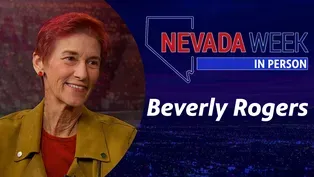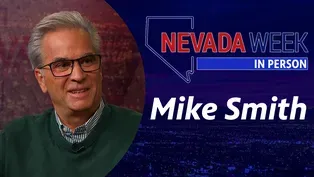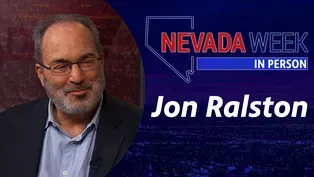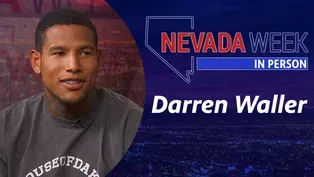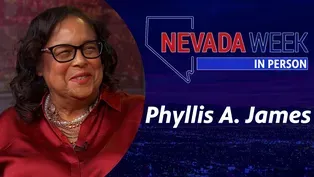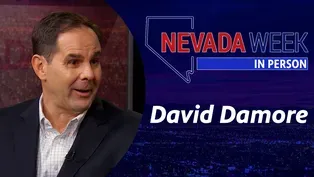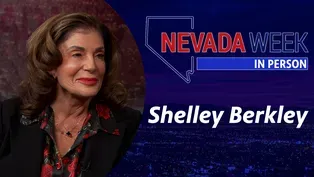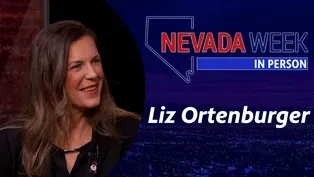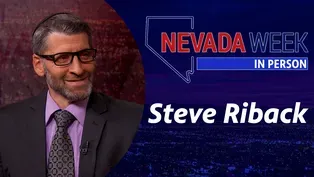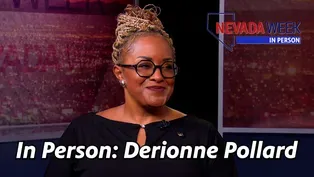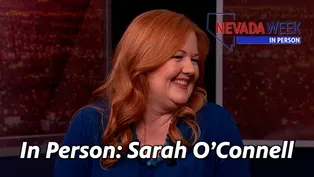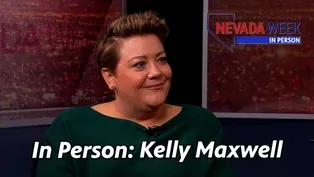
Nevada Week In Person | Imam Fateen Seifullah
Season 1 Episode 34 | 14mVideo has Closed Captions
One-on-one interview Imam Fateen Seifullah.
One-on-one interview Imam Fateen Seifullah.
Problems with Closed Captions? Closed Captioning Feedback
Problems with Closed Captions? Closed Captioning Feedback
Nevada Week In Person is a local public television program presented by Vegas PBS

Nevada Week In Person | Imam Fateen Seifullah
Season 1 Episode 34 | 14mVideo has Closed Captions
One-on-one interview Imam Fateen Seifullah.
Problems with Closed Captions? Closed Captioning Feedback
How to Watch Nevada Week In Person
Nevada Week In Person is available to stream on pbs.org and the free PBS App, available on iPhone, Apple TV, Android TV, Android smartphones, Amazon Fire TV, Amazon Fire Tablet, Roku, Samsung Smart TV, and Vizio.
Providing Support for PBS.org
Learn Moreabout PBS online sponsorshipMore from This Collection
Nevada Week In Person | Beverly Rogers
Video has Closed Captions
One-on-one interview with Rogers Foundation chair Beverly Rogers. (14m)
Nevada Week In Person | Mike Smith
Video has Closed Captions
One-on-one interview with Las Vegas Sun political cartoonist Mike Smith. (14m)
Nevada Week In Person | Jon Ralston
Video has Closed Captions
One-on-one interview with The Nevada Independent CEO Jon Ralston. (14m)
Nevada Week In Person | Darren Waller
Video has Closed Captions
One-on-one interview with Las Vegas Raider tight end Darren Waller. (14m)
Nevada Week In Person | Phyllis A. James
Video has Closed Captions
One-on-one interview Phyllis A. James. (14m)
Nevada Week In Person | David Damore
Video has Closed Captions
One-on-one interview with Chair of the Department of Political Science at UNLV David Damor (14m)
Nevada Week In Person | Shelley Berkley
Video has Closed Captions
One-on-one interview Senior Vice President for Touro University Shelley Berkley. (14m)
Nevada Week In Person | Liz Ortenburger
Video has Closed Captions
One-on-one interview with SafeNest CEO Liz Ortenburger. (14m)
Nevada Week In Person | Steve Riback
Video has Closed Captions
One-on-one interview with Las Vegas Metro Police Lieutenant Steve Riback. (14m)
Nevada Week In Person | DeRionne Pollard
Video has Closed Captions
One-on-one interview Nevada State College President DeRionne Pollard. (14m)
Nevada Week In Person | Sarah O’Connell
Video has Closed Captions
One-on-one interview with Director of Eat More Art LLC Sarah O’Connell. (14m)
Nevada Week In Person | Kelly Maxwell
Video has Closed Captions
One-on-one interview with Baby’s Bounty Executive Director Kelly Maxwell. (14m)
Providing Support for PBS.org
Learn Moreabout PBS online sponsorship-Imam of Las Vegas' oldest mosque and a pillar of the Historic Westside community, Imam Fateen Seifullah joins me this week for Nevada Week In Person.
♪♪♪ Support for Nevada Week In Person is provided by Senator William H. Hernstadt and additional supporting sponsors.
Welcome to Nevada Week In Person.
I'm Amber Renee Dixon.
While serving his second prison sentence, Imam Fateen Seifullah found Islam.
Committed to a life of service as a way to make up for his criminal past, Imam Saifullah helped drive crime out of Las Vegas' Historic Westside before becoming Imam of Las Vegas' oldest mosque, Masjid As-Sabur, in 1999.
Imam Seifullah, welcome to Nevada Week In Person.
-Thank you so much for having us.
-I'd like to expand a little bit more on the personal history.
-Okay.
-Where are you from, and were you raised in a specific religion?
-I'm originally from Shreveport, Louisiana.
My mother, may God bless her, she raised four boys, and we literally fled Shreveport Louisiana.
She was in a domestic violence relationship.
And so we moved to Los Angeles, California, Compton you might say in South Central area, and we were raised Baptist, Missionary Baptist.
I have two brothers that are preachers of COGIC, Church of God in Christ now, my two older brothers.
So we were raised in a pretty religious family until we got to Los Angeles.
-What happened in Los Angeles?
-Los Angeles was like being taken out of the frying pan into the fire.
You know, there was domestic abuse in Louisiana, but there was also a village.
There was aunts and uncles and neighbors who looked out for us.
When we got to South Central, there were gangs, and people were shooting at us.
And that was very new leaving the South.
-Shooting at you?
-You know, shooting it.
Also I remember my younger brother and I walking to school with-- walking from Compton through South Central, and the shooting takes place and we could hear the bullets.
He was third grade, I was sixth grade.
And so that was like our real introduction into Los Angeles.
-Is that how you entered a life of crime?
-After a while, you know, I grew up wanting to be a professional athlete or a fireman.
But in Los Angeles watching the gangs and the gangsters, I remember shifting and wanting to be a gangster.
And so while my other brothers, they did-- they stayed out of trouble, I started to court more that life.
-It was attractive?
-Yeah.
It had some appeal.
I saw those guys with the leather coats, and they were in charge and they were in control of their communities.
And in some ways, I wanted to be like them.
-When did you start serving prison time, and what for?
-So my mother again, God bless her, she rescued us again.
She took us out of Los Angeles before we got into gangs too deep, and we moved here to Las Vegas.
And when I was 18, 19, 1987 I got in trouble, possession of cocaine.
I sold cocaine during that time, crack.
That was the era of crack, and I went to prison in 1987.
And I was released in '89 and didn't stay home very long.
I just thought I had a better plan for the next run, and I went back again in 1990 and was released in 1992.
-So second time in prison is when you found Islam.
Who introduced you to it?
What convinced you to convert?
-I have a friend.
He passed away a year ago, a year before my wife actually, Gary Scott.
We know him as Chef Abdullah.
He saw me on the yard, and he kept calling me little soldier and kept encouraging me and reminded me that he saw more in me than just a street life.
And he talked to me about Islam in a way that I saw it as a tool for transforming myself and coming back to the streets--and my son was just about to be born--and being a better father.
Being a father, actually.
-How common is that scenario of being introduced to Islam in prison?
-It is-- In the 70s, 80s, and 90s, it was very common.
And even today young people, when they are searching for answers and maybe they were raised in Christian families may, whether they were participating actively or not, when they start looking for change, they look outside of the norm.
And so in prison, you do find Muslims, and they seem to be more disciplined and more concerned about their well-being and the people around them.
-When Gary Scott was referring to you as a soldier, that reminds me of more of the Nation of Islam which was, would you say militant?
How does it compare?
-Yes.
Gary Scott, his upbringing was in the Nation of Islam.
He was a Sunni Muslim, but he had some of the mannerisms still like the Nation in that they were, we may say, militant but more so disciplined.
And it may appear, and sometimes in some instances, to look like it was a militant movement, but they weren't.
They weren't known to fight much in the communities.
When people saw them, they saw their strength and saw their concern.
And so they were able to move out like an army without having to engage an awful lot.
-That strength and also that empathy-- -Yes.
--- you took that into the Historic Westside.
Is that where you originally moved with your mom from LA?
-No.
We moved into North Las Vegas.
I went to Rancho High School.
As I was mentioning earlier, it was probably-- There were only nine high schools then, so we knew everybody.
My brother who's a year older than me, the preacher, he was a dancer; my younger brother was an athlete; and I was a cool guy, you might say.
So it allowed us to get to know many of the people in the city.
And that helped when I started to worship in West Las Vegas area and was able to interact with the gangs and the drug dealers in that area.
I knew many of them.
-That interaction with the drug dealers and the gangs, did that happen through the mosque, Masjid As-Sabur?
-It happened as a result of an initiative.
Imam Mujahid Ramadan, who was the Imam there when I first got to the community, started an initiative, Enough is Enough, in 1992, and it was pushing drugs out of the community.
We would protest in front of drug houses.
And so I saw that I knew many of the drug dealers or the gang members, and that helped eventually in having conversations with them to move further away from the mosque.
-What would be the initial reasoning you used with them?
-You know, There are kids here.
We're trying to clean the neighborhood up.
Help us.
There was negotiation going on then.
Many of the elder drug dealers, or gangsters you might say-- I was one of them.
So we were able to say, Can you help me out?
Can you move this further down?
We didn't-- We shut down the ones that we could.
Others, we just asked them to push their business further back.
And when that didn't work, we had friends who were still in the life, and we would ask them to go and talk to them.
And it worked in many instances, but the problem was in many of those places, the housing.
You move one group out, another group comes in.
Thus the birth of the Muslim Village, the idea that we have to start buying some of the property if we want to see a change.
-That was your baby, the Muslim Village, and that happened when you became imam in 1999.
I think around that time was when you started it-- -Yes.
- --because you knew that just driving out the crime was not enough.
What else did you find was needed there?
-You know my wife, may God bless her, she passed away January 2nd.
The Masjid is located in what is called the hospitality corridor.
It's a nicer way of saying the homeless area, you know?
So we knew that there were people who needed food.
And so initially she started, we would load the 4Runner up with food and go out and serve.
And then later we started to serve on the grounds of the Masjid every Sunday.
And while doing that, we realized we needed to do more.
So we started a GED program for many years and then a community closet.
We provided clothing and a way for members to come into-- community members to shop.
And then after school programs.
Every need that we found in the inner city, we tried to meet in one way or another.
And she was always thinking about how to do that, whether it was utility assistance, delivering groceries to the seniors or to single family homes.
So all of those things actually helped us in our attempt to clean it up because some of the gang members' mothers were actually benefiting from some of the services.
-What do you think she would find the biggest priority to be there in the Historic Westside right now?
-You know, she was always concerned about the children.
And so the last initiative that she was engaged in, we started the free farmers' market, the free vegetable distribution, but she was also engaged in kid talk.
So we would get former gang members and sometimes successful people like Hasim Rahman to come and talk to them about avoiding street life.
And then we initiated Chess for Life.
We started to teach chess as strategies for avoiding some of the pitfalls that are found in the inner city, whether it's drugs or gangs or a life of crime.
So kids was her baby.
-How is the Historic Westside now compared to when you first began trying to drive out the drug activity?
-The Historic Westside is a roller coaster; it's up and down.
The councilmen that we have in the area, each of them have made effort and attempts to renovate dilapidated areas or transform it through business or through building initiatives.
Right now Councilman Crear, I think, is actively engaged in attracting developers to actually build new housing in the area.
And there's also this urban garden that's being built.
I think it's James Gray Park.
And so there'll be free vegetables and maybe a community store.
So I'm hopeful for the future.
It's a little quieter.
There are still needs that need to be met, but I believe that we're on track to do some of the things that we've been wanting to do for 20 years.
-Do you maintain the same relationship with gang members?
Is it as big of a presence?
-It's different now.
The young people are different.
There's not the same kind of leadership that was present during my time.
You knew who the leaders were.
Now there are pockets.
So we do walk the neighborhood.
We walk the projects.
We talk to young people and sometimes influencers.
So there's still some relationship, and we will play chess with them and engage them in some ways.
-And your relationship with the police there?
-It's a strange thing coming out of my background, you might say.
And some of the members coming from prison also who weren't accustomed to interacting with the police, we have actually a very good relationship.
Their community policing initiative has been at least successful in some ways in the area around Masjid As-Sabur.
If we need them, they respond quickly.
And sometimes during Ramadan, they will stop by and eat with us.
So it's a different relationship.
They still have work.
-Imam Sefullah, thank you so much for joining us for Nevada Week In Person.
To see this week's edition of Nevada Week, tune in on Sunday at 5:30 p.m or Tuesday at 7:30 p.m. ♪♪♪
Support for PBS provided by:
Nevada Week In Person is a local public television program presented by Vegas PBS
